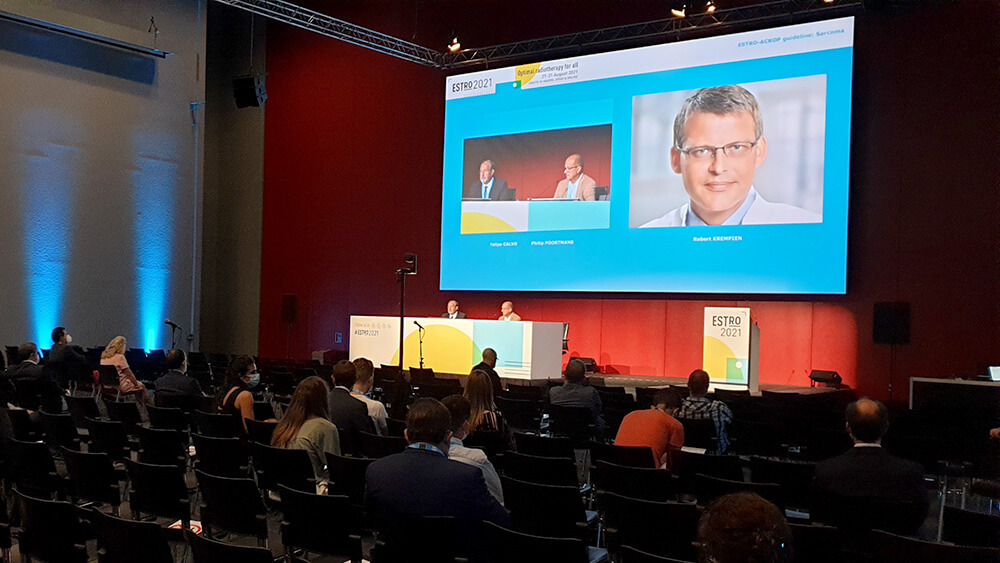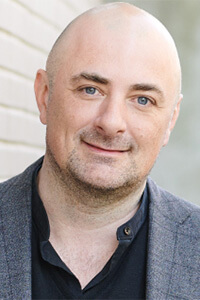
ESTRO met in Madrid in 2021 with the goal of raising awareness in the overall destination of the use of radiotherapy as a way to treat cancer. (ESTRO social media)
The pandemic has upended destinations’ view of business events as some kind of “subsidiary of tourism,” U.K.-based global urbanist Greg Clark, who spoke at the IMEX Policy Forum in Frankfurt in May, told Joint Meetings Industry Council’s The Iceberg platform. Events, he said, are now recognized as “being at the heart of the city’s reinvention.”
As a result, “there’s a new era of choice emerging,” Clark said. “It’s not so much that these cities want to host events at all costs. Actually, they want to host the business events that they think can contribute most to their city,” Clark said. “So if they have a challenge with cancer, they want to host oncology conferences. If they have a challenge with young people being homeless, they want to host conferences about housing. If they have a challenge with a certain kind of education or skills level, they want to host conferences about that. In other words, the purpose of hosting the conference is no longer just the hosting; it’s actually the embedding of what the conference has to offer and the matching of that with the imperative of the city itself.”

Alessandro Cortese
Five years ago, the European SocieTy for Radiotherapy and Oncology (ESTRO) developed a site-selection strategy for its annual congress — which this year attracted more than 6,700 delegates in Vienna, Austria — that favored those destinations that recognized, in Clark’s words, that they had a challenge with cancer.
ESTRO would send out a dual RFP, which included the functional aspects — infrastructure, event space, number of hotels, and the like — and also an engagement RFP. For the engagement RFP, the bidding destination would propose a project that would further ESTRO’s mission — to create better outcomes for cancer patients through radiotherapy — in its community. In other words, the “resources remain available for patients,” ESTRO CEO Alessandro Cortese said in a video on The Iceberg, long after “the congress is finished.”
Making an Impact in Madrid
ESTRO’s 2021 conference in Madrid is a case-study example. “When we got the bid for ESTRO,” Madrid Convention Bureau Director David Noack shared in the video, “we saw that 40 percent of it was infrastructure — the usual things — and 60 percent of the importance of the bid that the city had to propose was a legacy project. And in Spain, what ESTRO identified is that there was a lack of information about this kind of therapy. So this was the umbrella — we had to increase the awareness of radiotherapy as a way of treating cancer.”
One tangible way to do that, Noack said, was the development of a website, inforadioterapia.com, to provide information to patients, scientists, physicians, and families of patients with cancer “about what radiotherapic oncology means, because there was no source of information before that.”
At a presentation at the 2019 IBTM Policy and Practise Forum, also captured on video by The Iceberg, Sven Bossu, who at the time served as head of innovation at ESTRO, (and is now CEO of AIPC, the International Association of Convention Centres), broke down details of the dual RFP process. He noted that while ESTRO’s congress has continued to grow year upon year, growth for growth’s sake is not its aim. It’s not about the four days of the event, he said. “What we’re looking at is a three-to-four-year lasting impact of having an event across Europe for four days.”
‘It Did Not Happen as Hoped’
“That was the RFP approach we took about five years ago,” Cortese said. “In the meantime, several things changed — including a pandemic in between — and that is not the approach that ESTRO takes today and prepares to adopt in the next round of selection for the destinations of our congresses. In retrospect, things have gone very differently from what we had anticipated. The ESTRO-Madrid model proved to be not replicable — even for us in other destinations.”
Cortese told Convene via email, “In 2021, I said words I wouldn’t pronounce today: ‘We’re now in a phase where there is a relatively large group of early adopters that are learning and are discussing and are trying to apply their cases to different ideas that have been generated so far. The next phase will be a massive adoption by the whole industry — or not. What’s needed is for both associations and destinations to work hand-in-hand in those projects.’”
Cortese said the adoption of this model has happened only on the destination side, “supported by some approaches that standardize practices, not the associations.”
ESTRO has been used to telling “the story of how destinations can market strategically around SDGs and attract associations with a matching cause to the drivers of development of the city/region. That was not our design,
but for a while ESTRO has become the leading story in the industry about this approach from destinations.
“The result is that the dialogue between associations and destinations, in Europe at least, is at its lowest peak concerning impact and legacy — the topic may well be extinguished, already. Destinations talk about marketing and competitive edge through impact; associations talk about their missions. In between, there is almost no strategic overlap.
“The whole ESTRO model was based on the creation of those strategic common conditions. Today I can quite comfortably say that it did not happen as hoped.”
But all is not lost. Cortese said ESTRO will still try to run engagement projects in 2024 in Glasgow, Scotland, and in 2025 in Vienna. After those two events conclude, ESTRO will do a final evaluation to come up with a revised approach before proceeding with the new round of venue selections.
‘The Picture of Change’
The IMEX 2023 Policy Forum was called “Uncomfortable Conversations & Unexpected Solutions.” After several panels and roundtable discussions at the forum, Greg Clark offered the following reflections, according to a recap provided by IMEX:
“For the last three years, we’ve all been living through something that is quite confusing because it’s had different aspects of change going on with it — very different things are happening in different parts of the world. Anybody who thinks they’ve suddenly got the picture of change, I’m afraid you’re probably wrong. The reason you’re wrong is that I’ve been tracking what happens in 500 cities since the pandemic, and, in half the world, people are more than 100 percent back to the office, back to public transport, back to public space, back to public events. Yet in small parts of the world, the 4 percent that live in North America, for example, it is nowhere near back. Don’t extrapolate from what’s happening in one continent, with what’s happening around the world.”
On the Web
Read Greg Clark’s full interview at The Iceberg.
Michelle Russell is editor in chief of Convene.
